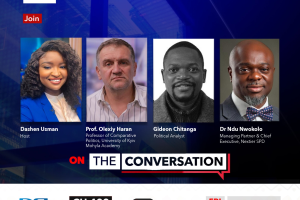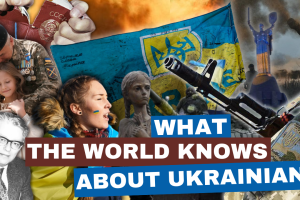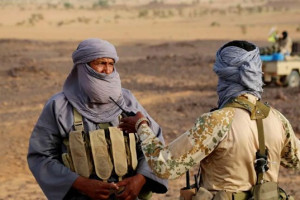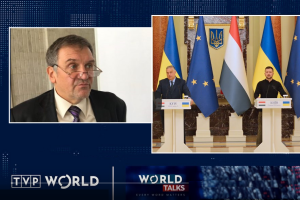Comedy star Zelenskiy rides TV popularity and populism into politics

One morning, a history teacher from Kyiv, Vasyl Holoborodko, wakes up as the president of Ukraine. This is not the opening of a Franz Kafka novel, but a satirical Ukrainian television series “Servant of the People,” which follows an honest man’s attempts to change a corrupt system.
“Why do our politicians come to power and make the same mistakes? It’s because they are only good at math! They only know how to subtract, divide, and multiply their wealth,” Holoborodko rants on the show.
Created by one of most successful television producers of Ukraine, Volodymyr Zelenskiy, the first two seasons of “Servant of the People” have been a hit. Holoborodko will return to the country’s television screens in March for the third season.
In the meantime, Zelenskiy, who plays Holoborodko, will try his chances in the March 31 presidential election.
His savvy populist campaign and TV fame already won him third place in the polls.
Zelenskiy appeals to voters dissatisfied with traditional ruling elites who will vote in protest, according to political expert Volodymyr Fesenko, head of the Kyiv-based Center for Applied Political Research.
This populism and his show business background have won Zelenskiy comparisons to the U. S. President Donald Trump.
Dark horse
As with Trump during the 2016 US presidential election, Zelenskiy has found fertile ground in the disillusionment of ordinary citizens with the powers that be.
In Ukraine, voters are so weary of the same cohort of politicians who have failed to deliver on their promises in the past that they are ready to elect someone new, even if that someone has neither political experience nor a political program.
Ukrainians aren’t new to populism. But Zelenskiy’s brand of populism differs from the populism of veteran politicians like ex-Prime Minister Yulia Tymoshenko or member of parliament Oleg Lyashko.
Nobody knows what policies Zelenskiy stands for as an aspiring leader of the nation.
While other contenders in the presidential race have rolled out elaborate election programs full of promises, Zelenskiy doesn’t even have one yet. Yet he turns its absence into an advantage.
“I will do it differently. We will write my political program with you,” he said in a video address on Facebook on Jan. 8, asking social media users to send him what they think are Ukraine’s biggest problems. The video has been viewed over a million times and received hundreds of comments with suggestions for his program.
An entertainer by trade, Zelenskiy said he would turn his election campaign into a reality show. In an interview with Ukrainska Pravda on Jan. 21, he shared his plans to live broadcast the work of his campaign office.
“We have to have an open country with an open government,” he said.
Zelenskiy’s campaign indeed has been different from those of other candidates. He announced his presidential bid on TV on New Year’s Eve, minutes before the end of the year. In that same time, other channels broadcast President Petro Poroshenko’s annual speech.
He threw a pizza party to celebrate his official nomination by his political party, which is called Servant of the People, like his TV show. He communicates with his audience through videos on Instagram and Facebook.
The actor smartly planned the promotion of the new season of “Servant of the People” to go hand in hand with his election campaign, making Zelenskiy indistinguishable from his character, a role model President Holoborodko.
And this, experts say, is a problem.
 “Zelenskiy, of course, has a right to partake in politics. But we don’t know anything about his team, his political orientation, his weak and strong sides. It is voting for a pig in a poke,” said Oleksiy Haran, a professor of political science of Kyiv Mohyla Academy and research dırector at the Democratic Initiative Foundation.
“Zelenskiy, of course, has a right to partake in politics. But we don’t know anything about his team, his political orientation, his weak and strong sides. It is voting for a pig in a poke,” said Oleksiy Haran, a professor of political science of Kyiv Mohyla Academy and research dırector at the Democratic Initiative Foundation.
TV personality
But Zelenskiy is not Holoborodko.
Unlike his character, he is not an Everyman. A 41-year-old native of the industrial city of Kryvyi Rih, with more than 630,000 people more than 400 kilometers southest of Kyiv, Zelenskiy is a wealthy and successful television mogul.
Over 15 years of its existence, his production studio Kvartal 95 has created dozens of top rated TV shows, musicals, sitcoms, and movies for Ukrainian viewers and Russian-speaking audiences abroad. Zelenskiy said his company sells their shows to 21 countries.
Zelenskiy was quick to react to his first crisis when journalists caught him lying about shutting down his filmmaking business in Russia that turned out to be active and receive funds from the Russian government.
Less than a week after the scandal broke on Jan. 17, he announced that he was leaving the ownership of a Cyprus-registered firm, Green Family Ltd, listed as a founder of three companies in Russia and Kvartal 95 in Ukraine.
Zelenskiy gained fame thanks to his scathing political satire. He has parodied numerous former and sitting politicians and oligarchs on stage, ridiculing their corruption and greed.
He scripts, directs, hosts, and acts in several prime-time comedy shows on 1+1, one of the most watched TV channels in Ukraine.
He is on the big screen too. A romantic comedy he directed starred, “Me, You, Him, Her,” has set a box office record with Hr 61.9 million ($2.2 million) in revenues in three weeks since its release in cinemas on Dec. 27. The movie has become the biggest box office success in the history of independent Ukraine, according to B&H Film Distribution Company.
Unlike Holoborodko, Zelenskiy doesn’t shy away from wealthy patrons. His presidential bid is believed to be backed by Ihor Kolomoisky, the self-exiled Ukrainian oligarch behind 1+1. In his recent interviews, the actor claimed they had only business relations with Kolomoisky and that 1+1 owed Kvartal 95 a lot of money.
Kolomoisky has been quite open about his dislike of President Poroshenko whom he accuses of illegally expropriating PrivatBank (it was nationalized in 2016 after revelations of large-scale fraud) and an attempt to seize control over 1+1 TV channel.
Political views
There are a few things we know about Zelenskiy’s political views from his recent interviews. His manner of speech is informal and metaphorical; he appeals to emotions and tends to over-simplify the solutions he proposes to current issues of Ukraine’s domestic and foreign policies.
“I want our people to get fatter,” he said. “So that the concept of ‘saving for a rainy day’ went into the background. So that the subculture of poverty was removed,” he said in a December interview with Ukrainian journalist Dmytro Gordon.
He believes (falsely, as analysts from VoxCheck platform proved) that the interest rates on loans from the International Monetary Fund are unreasonably high.
He reckons Ukraine isn’t welcome to be part of the European Union: “I never visit others when I’m not invited. I don’t want to feel inferior, don’t want to feel as a second-rate person,” he told journalist Gordon in December. “Who is awaiting us there? Is EU knocking on our door?”
In his words, negotiating the end of the Donbas war with Russian president Vladimir Putin sounds like a piece of cake, and the current administration has not tried hard enough.
“Everything is simple. We need to ask them: ‘What do you want? Why did you come to us?’ Write down their points,” he said. “Then I would take those points. We need peace on our conditions. Then I would say ‘Here are our points.’ We would find a common ground somewhere in the middle.”
Fighting corruption and oligarchy is quite simple too for Zelenskiy.
“We will impose the same rules for everyone. No exceptions,” he said in an interview with Ukrainska Pravda.
Odds of winning
 Iryna Bekeshkina, director of the Democratic Initiatives Foundation, believes Zelenskiy stands a low chance of winning the presidency: He is leading the polls among young people under 30, but his voter base might not vote at all, she said.
Iryna Bekeshkina, director of the Democratic Initiatives Foundation, believes Zelenskiy stands a low chance of winning the presidency: He is leading the polls among young people under 30, but his voter base might not vote at all, she said.
Young people are generally less active voters than the older population. In addition, in Ukraine, a voter has to go through a bureaucratic procedure if he wants to cast a ballot not at the polling station near his or her place of registered residency.
“A lot of young people moved to bigger cities or abroad. I doubt many will bother changing the polling station,” she told the Kyiv Post.
“Zelenskiy is a person who has neither political experience nor political views,” she said. “A cool guy is not a profession.”
Source: Kyiv Рost








